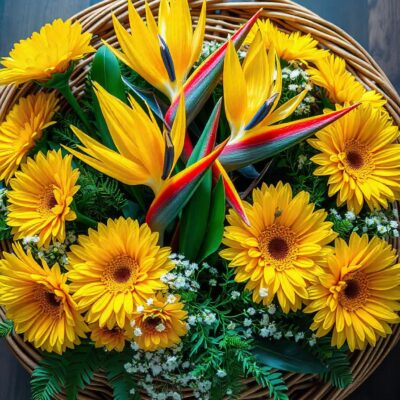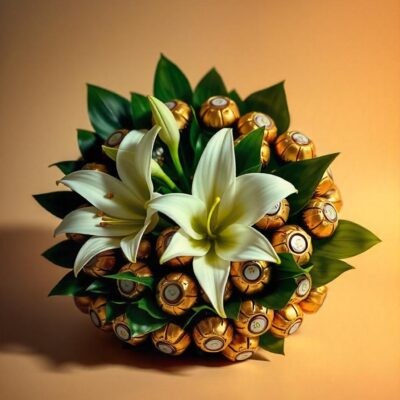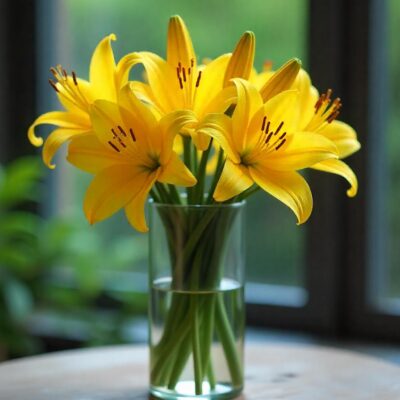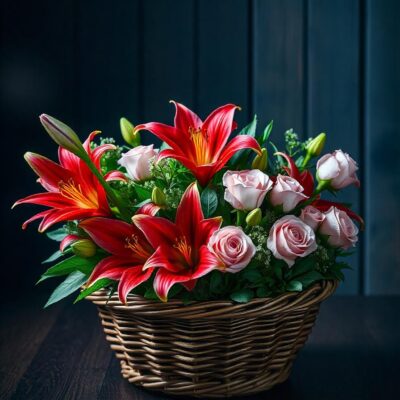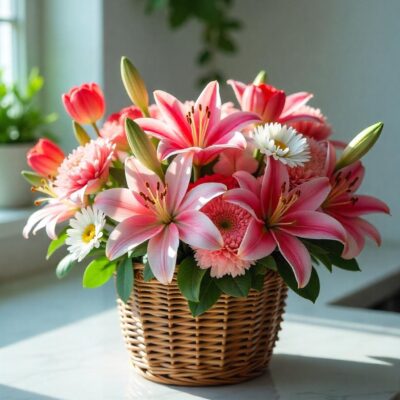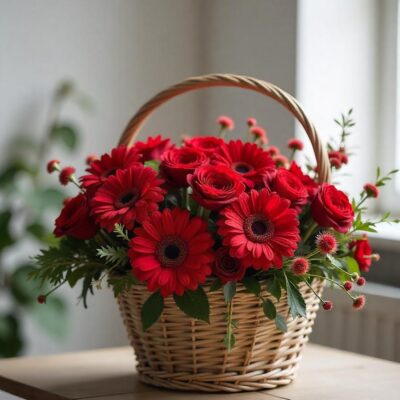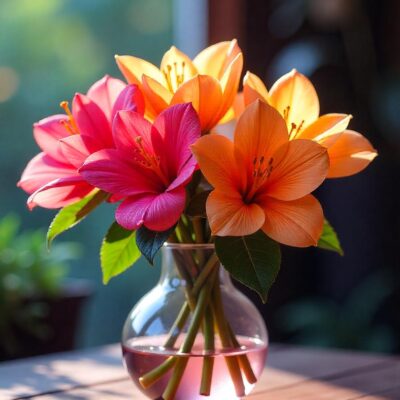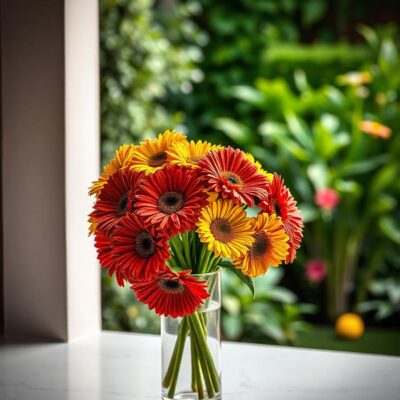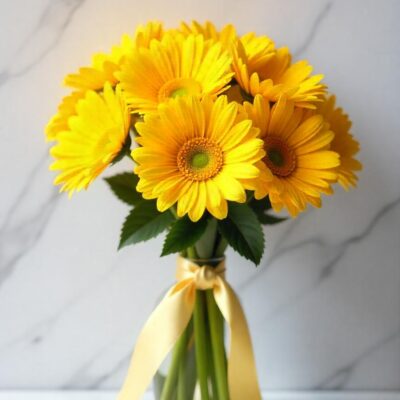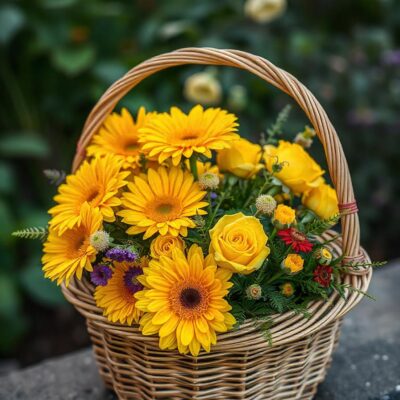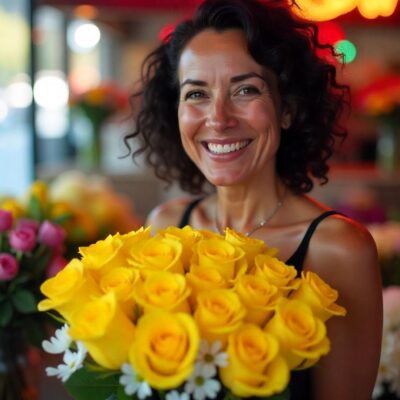- Home
- Page
Send Flowers to Thrissur
Thrissur (Trichur) is home to many leading Malayali entrepreneurs, and is a major financial and commercial hub of Kerala. Historians say that King Sakthan Thampuran had invited several Syrian Christian families and Brahmins to settle in Thrissur (Trichur) city from their business centers in adjoining areas. Soon, Thrissur (Trichur) became a flourishing centre of internal trade in Kerala. Thrissur (Trichur) is one of the major manufacturing centers of plain gold and rolled gold jewelry in South India; up to 70% of Kerala’s jewellery is manufactured in Thrissur (Trichur). There are around 3,000 gold ornaments manufacturing units in the city and 40,000-odd artisans and others work in these units. The industry provides direct and indirect employment to 200,000 people in Thrissur (Trichur). The artisans based in these units, craft nearly 85 percent of one tonne gold which is used per day in Kerala. About 90 tonnes of gold was being used annually in Kerala for manufacturing of ornaments daily.
Starting from the Stone Age, Thrissur (Trichur) must have been the site of human settlement. This is evidenced by the presence of a megalithic monuments at Ramavarmapuram, Kuttoor, Cherur and Villadam. The Ramavarmapuram monument is in granite and is of Menhir type. The monument in Ramavarmapuram is 15 feet height and 12 feet 4 inches broad. From 1944, it is under the protection of Department of Archaeology. The monument is locally known as ‘Padakkallu’ or ‘Pulachikkallu’. These menhirs are memorials put up at burial sites for the departed souls. They belong to the Megalithic Age of Kerala, which is roughly estimated between 1000 BCE and 500 CE. All such monuments have not been dated exactly. Some experts are of the view that these are the remnants of the Neolithic Age in the development of human technology. The Ramavarmapuram Menhir is also believed to be a monument belonging to the Sangam period in the South Indian history.
The name Thrissur (Trichur) is a shortened form of Thrishivaperur or Thirushivaperur. Thiru-Shiva-Perur (Malayalam: ????-???-???????) literally translates to ‘The Land, Place, City or Village with the name of the “Lord Siva”‘ means ????? Shambhu (Lord Siva) + ? or ?? (of) + ????? Grama (Community/Village) Shambhala village or Shambal gram. (The Lord Kalki will come from Shambal gram of South India) ?. The name owes itself to the most prominent feature of the city, that is the Vadakkumnathan Kshetram or temple, which has Shiva as its presiding deity. Alternately, Thri-Shiva-Perur (Malayalam: ????-???-???????) means the place with three famous Shiva temples which are said to be — the Vadakkunnathan Temple, Kottapuram Shiva temple and the Poonkunnam Siva Temple. Thrissur (Trichur) was also known as “Vrishabhadripuram” and “Tenkailasam” (? Tamil: ???? ???????) (Kailasam of the South) in ancient days.
Thrissur (Trichur) has played a significant part in the political history of South India. The city of Thrissur (Trichur) is represented in the Kerala State Assembly by two elected members, one from Thrissur (Trichur) Assembly Constituency and another from Ollur Assembly Constituency. Therambil Ramakrishnan is the representative of Thrissur (Trichur) Assembly Constituency and M.P Vincent from Ollur Assembly Constituency. Thrissur (Trichur) is also a part of the Thrissur (Trichur) Lok Sabha constituency and elects a member to the Lok Sabha, the lower house of the Parliament of India, once every five years. The current MP is P. C. Chacko. The Lok Sabha seat has been held by the Indian National Congress for six terms (1951–1957, 1984–1989, 1989–1991, 1991–1996, 1999–2004 and 2009–2012) and the Communist Party of India for nine terms (1957–1962, 1962–1967, 1967–1970, 1971–1977, 1977–1979, 1980–1984, 1996–1997, 1998–1999 and 2004–2009).
The Southern Railway Zone of the Indian Railways operates the main rail transport system in Thrissur (Trichur). There are four railway stations in Thrissur (Trichur) City. Thrissur (Trichur) Railway Station, one of the busiest stations in Kerala provides trains to three directions and lies on the busy Shoranur-Cochin Harbour section. It has a satellite station, Poonkunnam Railway Station and two minor stations, Ollur Railway Station and Mulankunnathukavu Railway Station. Thrissur (Trichur) Railway Station also connects to the temple town of Guruvayur by Thrissur (Trichur)-Guruvayur Section. In addition, Southern Railways are planning a suburban railway system connecting Thrissur (Trichur) to Kochi and Palakkad using Mainline Electrical Multiple Unit services (MEMU), with the first services are expected to begin in late 2010 or early 2011 for which works are underway.
However, during 1750-60 Hyder Ali, the Sultan of Mysore, attacked Thrissur (Trichur) and became tributary of the Kingdom of Mysore. Tipu Sultan, his son led another invasion in 1786 to Thrissur (Trichur), where he destroyed the churches of Syrian Malabar Nasrani community and Hindu temples. Tipu Sultan’s Army set fire to the church at Palayoor and attacked the Ollur church. He plundered Thrissur (Trichur)’s economy and even converted Christians and Hindu’s into Muslims. The economy of Thrissur (Trichur) totally collapsed because of this invasion. Later he made a retreat from Thrissur (Trichur), which served as the headquarters of Kerala region, after the Srirangapattanam war. In the meantime, Rama Varma X, the successor of Sakthan Thampuran signed a treaty with East Indian Company, and made Cochin a subsidiary of the British.
Another monolithic monuments like Dolmens and rock-cut caves are at Porkulam, Chiramanengad, Eyyal, Kattakambal and Kakkad. According to historians, the Dolmens are burial sites. Though most of the monuments were well protected, the dolmen at Porkulam was in a neglected condition. The monument excavated under eminent Archaeologist B. K. Thapar, between 1949 and 1950, was under the Department of Archaeology. Another megalithic monument is situated at Ariyannur in Thrissur (Trichur). This place has unravelled monuments such as the ‘Kudakkallu’ or ‘Thoppikkallu’ (Mushroom stones or Umbrella stones) and ‘Munimada’ (Saint’s abode). The laterite hillocks of Ariyannur rise to about 50 metres. Another reference in Ariyannur dates back to early 15th century in the poem ‘Chandrotsavam’.
According to Reserve Bank of India, the city in the 1930s boasted of head offices of 58 banks and was recognised by RBI as ‘Banking Town’. Even now also it’s the headquarters of major banks like South Indian Bank, Catholic Syrian Bank, Dhanalakshmi Bank, Lord Krishna Bank and non-banking institutions like Manappuram General Finance and Leasing Ltd, Kerala State Financial Enterprise and ESAF Microfinance and Investments. The city’s financial capabilities also saw the rise of Chit fund. According to All Kerala Kuri Foreman’s Association, Kerala have around 5,000 chit companies, with Thrissur (Trichur) District accounting for the maximum of 3,000. These chit companies provide employment to about 35,000 persons directly and an equal number indirectly.
Thrissur (Trichur) is also known as the Cultural Capital of Kerala because of its cultural, spiritual and religious leanings throughout history. It houses the Kerala Sangeetha Nadaka Academy, Kerala Lalithakala Akademi and Kerala Sahitya Academy. The city hosts the Thrissur (Trichur) Pooram festival, the most colourful and spectacular temple festival in Kerala. The festival is held at the Thekkinkadu Maidan in April or May. Thrissur (Trichur) has a large number of well-known temples including the Vadakkumnathan temple, Thiruvambadi Sri Krishna Temple and Paramekkavu temple, as well as two famous churches, the Our Lady of Lourdes Syro-Malabar Catholic Metropolitan Cathedral and the Our Lady of Dolours Syro-Malabar Catholic Basilica.
The city is also emerging as the largest hub for Ayurvedic drug manufacturing industry in the India. Out of the 850 ayurvedic drug-manufacturing units in Kerala, about 150 units, including some of the major ayurvedic drug manufacturers in the Kerala state are located in and around the city. Of these, some of the companies like the Oushadhi, Vaidyaratnam Oushadhasala, KP Namboodiris, Sitaram Ayurvedic Pharmacy Ltd, Kandamkulathy Vaidyasala, SNA Oushadhasala etc. are among the leading ayurvedic drug manufacturers in the state. Thrissur (Trichur) Ayurveda Cluster, anonther initiative by a group of Ayurvedic manufacturers of Thrissur (Trichur), has developed a cluster in KINFRA Park in Koratty in Thrissur (Trichur) District.
The modern City of Thrissur (Trichur) rose to importance after Sakthan Thampuran ascended the throne of Kingdom of Cochin (1769-1805). He changed the capital of Cochin Royal Family to Thrissur (Trichur) from Mattancherry and abolished the power of Namboothiri community, which controlled most of the temples of Thrissur (Trichur) district. The maharaja destroyed the forest around the Thekkinkadu Maidan which seats the Vadakkumnathan temple, and started the most spectacular cultural festival called Thrissur (Trichur) Pooram. Sakthan Thampuran laid the modern foundation stone of Thrissur (Trichur) and made the city into a major financial and commercial hub of South India, by inviting Syrian Christian families and Brahmins from adjoining areas.
Thrissur (Trichur) has historically been a center of Hindu scholarship. The city houses one of the most important temples of Hindu Shaivism, that is the Vadakunnathan temple. The district is also home one of the most holiest Hindu Vaishnava temples, the Guruvayur temple. Christianity, Islam and Judaism entered into the Indian subcontinent through the Thrissur (Trichur) district. The works of scholars and Eastern Christian writings claim Thomas the Apostle to have set foot in Muziris near here 2,000 years ago. (AD 51-52) The country’s first mosque, Cheraman Juma Masjid, opened in AD 629. It has opened the gates for Arabs, Romans, Portuguese, Dutch and English.
Thrissur (Trichur) City is served by Cochin International Airport (Nedumbassery), which is about 55 kilometers away. Direct domestic flights are available to major Indian cities like Chennai, New Delhi, Mumbai, Bangalore and Kolkata. International flights to Middle East cities like Bahrain, Muscat, Sharjah, Jeddah, Riyadh, Doha and to Southeast Asian cities Singapore and Kuala Lumpur are available here. It has a dedicated Heli-taxi service and Chartered flights. Calicut International Airport at Karipur, is 80 kilometers from the city and Coimbatore Airport, which is 114 kilometers from the city also can be used by travelers.
Thrissur (Trichur) pronunciation (help·info) (Malayalam: ???????, Sanskrit: ????????????), originally Thrisivaperoor and previously known by its anglicized form as Trichur, is the fourth largest city, the third largest urban agglomeration in Kerala (Pop. 1,854,783) and the 20th largest in India. It is also the headquarters of the Thrissur (Trichur) District. The City is built around a 65-acre (26 ha) hillock called the Thekkinkadu Maidan which seats the Vadakkumnathan temple. Thrissur (Trichur) was once the capital of the Kingdom of Cochin. It is located 300 kilometres (186 mi) towards north-west of the state capital Thiruvananthapuram.
K. Karunakaran, the Bhishma of Kerala politics started his career in Thrissur (Trichur) as a painter. Later on he became the “Leader” of city. During his regime Thrissur (Trichur)-Guruvayur Section and Poonkunnam Over Bridge was built. Vinod Rai, the Comptroller and Auditor General of India, is another person who turned fortunes of the city by building Sakthan Thampuran Nagar (S.T.Nagar) when he was collector of Thrissur (Trichur) district. He is also known as the second Sakthan Thampuran of Thrissur (Trichur) by shifting the Municipal Stand near the M.O. Road to Shaktan Thampuran Nagar, now known as Shaktan Thampuran Private Bus Stand, Thrissur (Trichur).
A film festival, known as ViBGYOR Film Festival, is held in the city every year. It is an international short and documentary film festival. Telephony services are provided by various players like Aircel, Airtel, Idea cellular, Vodafone, Reliance Infocomm, Tata Docomo, MTS, Uninor, Tata Indicom and the state owned BSNL. BSNL is also offering 3G services in Thrissur (Trichur) which will enhance services such as multimedia, high speed mobile broadband, Internet access with the ability to view video footage on mobile handsets. The city also have Broadband wireless services on WiMAX platform.
P.S. Rao, advisor to the Rajapramukh and acting Governor of Kerala, is another person who Thrissur (Trichur)ian is indebted to. He expanded Thrissur (Trichur) City by shifting all the administrative and government offices like Thrissur (Trichur) Collectorate to Ayyanthole from Chembukavu. Government Engineering College, Thrissur (Trichur), is another gift from Joseph Mundassery, the controversial former education minister who introduced Kerala Education Act. C. Achutha Menon, the former Chief Minister of Kerala gifted Kerala Agricultural University in 1971, a university for all agricultural related activities.
Under the Köppen climate classification, City of Thrissur (Trichur) features a Tropical monsoon climate. Since the region lies in the south western coastal state of Kerala, the climate is tropical, with only minor differences in temperatures between day and night, as well as over the year. Summer lasts from March to May, and is followed by the South-west monsoon from June to September. October and November form the post monsoon or retreating monsoon season. Winter from December through February is slightly cooler, and windy, due to winds from the Western Ghats.
Thrissur (Trichur) is also a prime centre in South India for students seeking entry into the professional courses. As many as 17,000 students, mostly from parts of Kerala and some from outside, are undergoing coaching at the P.C. Thomas Centre, the largest coaching center for engineering and medical entrance exams in Kerala, run by Professor P C Thomas. The presence of such a huge number of migrant students has almost reshaped the economic structure of the City and brought good times to traders, hotels and transport and entertainment industries.
In 1947, when India gained independence from the British rule, Thrissur (Trichur) was under Kingdom of Cochin. Thrissur (Trichur) district was formed on July 1, 1949, with the headquarters at Thrissur (Trichur) City. The City is usually referred to as the Cultural Capital of Kerala . The City had been a breeding ground of famous politicians and bureaucrats like R. K. Shanmukham Chetty, P.C. Rao, C. Achutha Menon, K. Karunakaran, Joseph Mundassery, Vinod Rai etc. after the independence. These individuals have changed the trajectory of Thrissur (Trichur) City afterwards.
The region can claim to have played a significant part in fostering the trade relations between Kerala and the outside world in the ancient and medieval period. The early political history of Thrissur (Trichur) is interlinked with that of the Chera Dynasty of the Sangam age, who ruled over vast portions of Kerala and Tamil Nadu. After the Cheras, the place was later ruled by the Kingdom of Cochin (Perumpadapu Swaroopam). Later, a powerful dynasty known as Zamorins of Calicut captured most of the Thrissur (Trichur) in 14th and 15th century.
The City is drained in the monsoonal season by heavy showers. The average annual rainfall is 3000 mm. The South-west monsoon generally sets in during the last week of May. After July the rainfall decreases. On an average, there are 124 rainy days in a year. The maximum average temperature of the City in the summer season is 33 degree Celsius while the minimum temperature recorded is 22.5 degrees Celsius. The winter season records a maximum average of 29 degree Celsius and a minimum average of 20 degree Celsius.
The first cinema hall in Kerala, with a manually operated film projector, was opened in Thrissur (Trichur) by KW Joseph in 1907. In 1913, the first electrically operated film projector was established in city again by Jose Kattukkaran and was called the “Jose Electrical Bioscope”. Jose Theater, the first theater in Kerala equipped with a movie projector, is in this city. Ragam, Ramdas, Girija, Kairali, Sree, Jose, Swapna and Bindhu are the theaters which show Malayalam, Tamil, English and Hindi movies in the city.
City of Thrissur (Trichur) serves as a centre for healthcare in the Central Kerala. This portion covers Thrissur (Trichur) district, Palakkad district, Malappuram district and northern part of Ernakulam district. Most of the people in these districts come to City of Thrissur (Trichur) for their medical care. There are three medical colleges, Government Medical College, Thrissur (Trichur), Amala Institute of Medical Sciences and Jubilee Mission Medical College and Research Institute, and few other hi-tech hospitals.
The city has served as an incubator for many Malayali entrepreneurs, and is a major financial and commercial hub of Kerala. It flexes its economic muscle in India as the headquarters of three major scheduled banks, South Indian Bank Ltd, Catholic Syrian Bank and Dhanalakshmi Bank Ltd and a clutch of Chit funds. The city is also a big centre for shopping in Kerala for silks and gold jewelry. Thrissur (Trichur) attracts the largest number of domestic tourists in Kerala.
Private FM radio stations in the Thrissur (Trichur) are Club FM 104.8 MHz, Radio Mango 91.9 MHz, BEST FM 95 by (Asianet Communications Limited), Red FM 91.1 MHz. The transmitter of the All India Radio (630 kHz) was commissioned on November 4, 1956. The station started independent broadcasting in 1974. Thrissur (Trichur) has a Doordarshan studio with a low power transmitter located near the studio.
Apart from being the cultural nerve centre of Kerala, it is also a major academic hub and is home to several educational institutions including the Kerala Kalamandalam, Jawahar Bal Bhavan Thrissur (Trichur), Kerala Police Academy, Kerala Agricultural University, Kerala University of Medical and Allied Sciences and Kerala Institute of Local Administration (KILA).
CopyRights © 2024 flowersnjoy.com. All Rights Reserved





